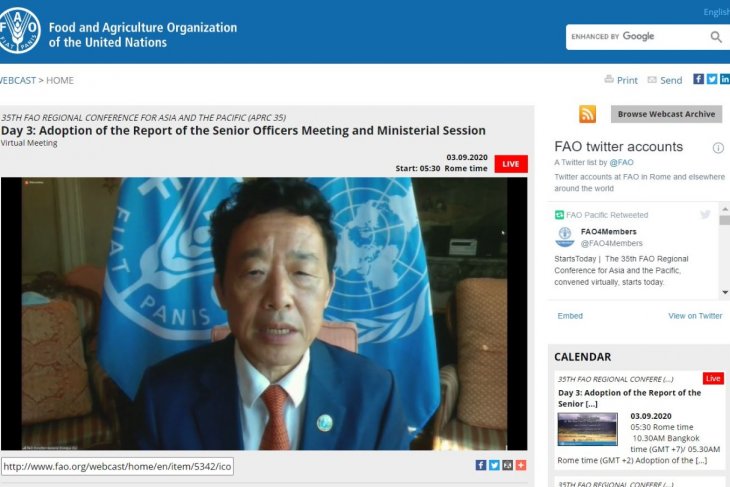Live Streaming
Program Highlight
Company Profile

Ani Hasanah
Indonesia has recorded 3,269 new COVID-19 cases in the last 24 hours, which have brought the total tally of infections to 187,537, as of Friday, according to the country's Task Force for COVID-19 Response.
With 2,126 people recovering from COVID-19, the total recoveries stand at 134,181, the task force noted in a report released on Friday.
Meanwhile, the death toll has reached 7,832, with 82 people succumbing to the disease within the last 24 hours.
The figures suggest that the country currently has 45,524 active cases, or patients still receiving treatment or undergoing self-isolation. By Friday, 85,178 suspected patients have been placed under surveillance.
On Friday, the authorities examined 36,268 specimens from 18,100 people at 320 laboratories across the country. Since Indonesia reported its first confirmed cases in March 2020, a total of 2,375,133 specimens from 1,371,391 people have been examined in the country.
COVID-19 positive cases have been reported in 34 provinces, with 489 cities and districts affected by the pandemic.
Meanwhile, five provinces have recorded the highest number of new cases on Friday, with Jakarta reporting 880 fresh cases, West Java 385, East Java 350, East Kalimantan 281, and Bali 196.
The provinces of Central Sulawesi and West Sulawesi reported no new cases on Friday. (ANTARA)
September
 Vice President Ma'ruf Amin during a teleconference with officials of the Indonesia Institute of Islamic Dawah (LDII) on Thursday (Sept 3, 2020). ANTARA/HO-Vice Presidential Secretariat/sh
Vice President Ma'ruf Amin during a teleconference with officials of the Indonesia Institute of Islamic Dawah (LDII) on Thursday (Sept 3, 2020). ANTARA/HO-Vice Presidential Secretariat/sh
Indonesian Vice President Ma'ruf Amin has urged the Indonesia Institute of Islamic Dawah (LDII) to partake in the deradicalization program for people exposed to radicalism and extremism in a bid to return to moderate Islam.
"This is our common task to prevent and counter radicalism. Bringing back those exposed (to radicalism) has become the responsibility of us all, including the LDII," Amin noted in a statement in Jakarta on Friday.
The vice president admitted that radicalism and extremism existed in the country, for which deradicalization and counterradicalism efforts must be made unceasingly through wasathiyah (moderate) preaching, among others.
"The threat of radicalism exists. It is one of my tasks to build a commitment to counter radicalism. We have to strengthen prevention efforts and counter radicalism," he stated.
Harmony among different religious groups has become the key to preventing and curbing the swift spread of radicalism in the country.
The vice president has appealed to all mass organizations, especially the religious-based groups, to participate in maintaining religious harmony in Indonesia.
"I called on LDII to partake in efforts to maintain harmony among religious groups and build the nation's unity and oneness. This is because harmony is the key factor for the nation's unity," he remarked.
Amin held a teleconference with LDII officials on late Thursday (Sept 3). He is upbeat about the institute improving its service to Indonesian Muslims.(ANTARA)
September

FAO director-general Qu Dongyu delivers a speech at the 35th Session of FAO’s Regional Conference for Asia and the Pacific (APRC), held on Thursday (September 3, 2020). (HO-FAO Indonesia)
Government representatives from 46 countries in the Asia-Pacific region gathered online on Thursday to examine the state of regional food security and highlighted the need to build a more resilient food system in the region.
The 35th session of FAO's Regional Conference for Asia and the Pacific (APRC) put special emphasis on the implications of the spread of the coronavirus and its impact on food systems region-wide, according to a release issued by FAO Indonesia, which was received in Jakarta on Thursday.
The Asia-Pacific region is home to more than half of the world's undernourished. While the prevalence of hunger has decreased slightly, the region is far behind the pace needed to eradicate hunger and malnutrition by 2030, the Sustainable Development Goal deadline set by the global community to eliminate hunger and malnutrition in all its forms, the statement said.
Speaking to more than 400 participants of the online conference from Rome, FAO director-general Qu Dongyu highlighted the negative effects of the pandemic, which have been felt across the entire food system.
"Measures to control virus outbreaks are disrupting global food supply chains. Border restrictions and lockdowns are destroying livelihoods and hindering food transport. Food loss and waste is increasing, as farmers must resort to dumping perishables, and many people in urban centers are struggling to access fresh food," he noted.
Qu stressed that smallholder farmers and their families, food workers in all sectors, and those living in a commodity- and tourism-dependent economies, are particularly vulnerable.
"They urgently need our attention. We need to re-examine our food systems and value chains, make greater use of existing agricultural innovations and technologies, and consider new ones," he said.
In response to the pandemic, the FAO has launched the FAO COVID-19 Response and Recovery Program, which allows donors to leverage the organization's convening power, real-time data, early warning systems, and technical expertise to provide direct support, where and when it is needed the most.
The FAO Regional Conference serves as a forum for addressing current and emerging regional trends and challenges. This year's conference mulled the FAO's new Hand-in-Hand Initiative.
The initiative focuses on improving the potential of disadvantaged areas and groups of the population, in line with the UN's commitment to "leave no one behind”. (ANTARA)
The Indonesian Task Force for COVID-19 Response, Monday, reported 2,743 fresh cases in the country over the last 24 hours, bringing the tally to 174,796, and 1,774 recoveries, thereby totaling 125,959 people recovering from COVID-19.
Furthermore, 74 people died of COVID-19, bringing the death toll to 7,417 since the Indonesian government announced its first confirmed COVID-19 cases on March 2, 2020.
A total of 15,305 samples were subject to examination, bringing the total number of specimens examined in the country, so far, to 2,239,642.
Jakarta remained the city with the largest recorded rise in the number of fresh cases, reaching 1,049, followed by 323 cases in East Java, 179 cases in Central Java, 145 cases in West Java, and 129 cases in Bali.
Meanwhile, East Java Province recorded the highest death toll within a day, notably 21 people succumbing to the disease, followed by 14 deaths in Jakarta.
The largest number of recoveries on Monday was recorded in Jakarta, reaching 404, followed by 383 people recovering from the disease in East Java.
The capital city recorded 40,086 confirmed cases, so far, followed by 33,543 cases in East Java, 13,964 cases in Central Java, 11,978 cases in South Sulawesi, and 11,063 cases in West Java.
The total number of recoveries in Jakarta has reached 30,538, while 26,139 in East Java, 9,247 in South Sulawesi, 8,973 in Central Java, and 6,150 in West Java. (ANTARA)



